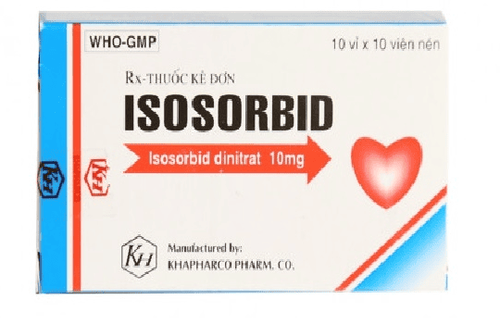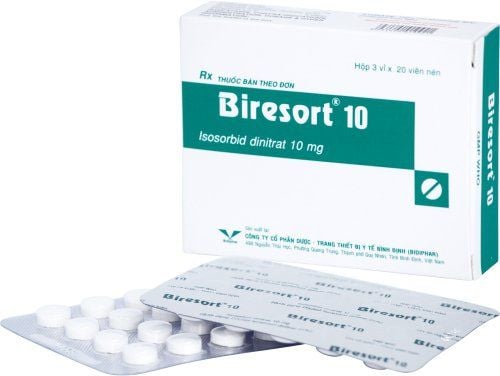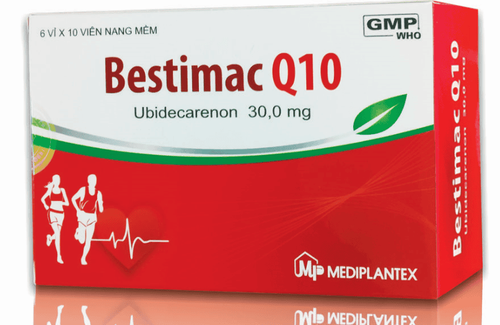This is an automatically translated article.
Metolazone is a quinazoline diuretic with properties similar to thiazide diuretics. In addition to helping to increase urine output and eliminate water from the body, the drug is also used to treat high blood pressure (monotherapy or in combination with other drugs).1. Metolazone diuretic and antihypertensive treatment
Metolazone is a diuretic that increases urine output and aids in the release of excess water from the body. In addition, the drug also has other uses such as:Treatment of hypertension (monotherapy), or used in combination with other groups of blood pressure drugs; Reduce swelling, fluid retention (edema) in congestive heart failure; Reducing edema in renal pathology, including nephrotic syndrome and states of impaired renal function; Reduce edema during pregnancy; Improve symptoms of shortness of breath.
2. Instructions on how to take Metolazone
2.1. Metolazone should be taken orally once a day, with or without food. Dosage should be determined based on your medical condition and response to treatment.
Note:
If you take the medicine too close to bedtime, you may have to wake up to urinate. Therefore, it is best to take the medicine at least 4 hours before going to bed; For the treatment of hypertension, the medication should be continued even if you feel better. Most people with high blood pressure do not feel any change in the disease. Therefore, do not stop taking the medicine on your own without consulting your doctor. It may take 3-6 weeks to see a noticeable reduction in blood pressure. 2.2. Dosage Dosage for adults:
Treatment of hypertension: Start with a dose of 1.25 - 2.5mg x 1 time / day. Maintain with dose 2.5 - 5mg/time/day. Regular monitoring to adjust dose response to treatment progress. Consider using the lowest dose (if possible) to maintain the desired therapeutic response. Do not take more than 5mg/day; Treatment of edema in heart failure & kidney disease: Start with a dose of 5-20mg x 1 time/day. Patients with paroxysmal nocturnal dyspnea may be given larger doses to ensure 24-hour diuresis & salivation. Do not take more than 20mg/day; Dosage for children: Treatment of edema due to heart failure & kidney disease, orally 0.05 - 0.1mg/kg x 1 time/day. Long-term use of this drug is not recommended.
3. Side effects of the drug Metolazone
During treatment, users may experience some side effects of Metolazone. Specifically:
Common side effects: Dizziness, feeling dizzy, tired, sleepy, depressed mood, stomach pain, loss of appetite,... Uncommon side effects: Cold limbs, edema, palpitations, orthostatic hypotension, anxiety, depression... Stop taking Metolazone and call your doctor if you experience serious signs such as: Dry mouth, extreme thirst; Nausea, vomiting; heart palpitations, irregular heartbeat; Feelings of weakness, drowsiness, restlessness, or delirium; Muscle pain or weakness; Chest pain; Urinating less than usual or anuria; Numbness or tingling or burning sensation.
4. Note when taking Metolazone
Metolazone is contraindicated in the following cases:
Patient is suffering from anuria (no urine in the bladder); Hepatic coma (hepatic brain); Preeclampsia ; Allergy or hypersensitivity to the components of Metolazone. Cases needing caution when using Metolazone:
People who are allergic to drugs derived from Thiazide, Sulfonamide or Tuinethazone (risk of cross-allergy); Women who are breast-feeding (consider stopping breastfeeding or stopping medication); Patients with diabetes mellitus (may increase blood glucose concentration, hyperglycemia, urinary tract); Patients with gout (may increase serum uric acid levels, sometimes giving rise to gout attacks). The drug should be discontinued prior to performing thyroid function tests.
5. Metolazone drug interactions
During use, Metolazone may interact with the following medicinal products, should be considered when used simultaneously:
Anticoagulants such as Warfarin (Coumadin); Antidiabetic drugs (Sulfonylurea, Insulin); Antihypertensive drugs; Glycosides (cardiac glycosides); Neuromuscular blocking agents (Tubocurarine); Corticosteroids, Corticosteroids (adrenal cortex hormone, ACTH); Methenamine (Hiprex, Urex, Mandelamine); Non-steroidal anti-inflammatory drugs (NSAIDs); Loop diuretics; Lithium salts; Vitamin D ; Salicylates such as aspirin, Disalcid, Pills Doan, Dolobid, Salflex, Tricosal, and others. To avoid unwanted side effects due to drug interactions, users should share with their doctor all the medications they are taking. Your doctor can help you arrange a suitable dosing schedule or give you instructions on how to adjust your dose.
Please dial HOTLINE for more information or register for an appointment HERE. Download MyVinmec app to make appointments faster and to manage your bookings easily.













